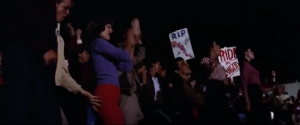13 Grease (1978)
What’s the deal with Grease (1978)?
By Seth Duffy
Grease is an exciting movie from the late 70’s. It stars a young John Travolta and, alongside Saturday Night Fever, catapulted him into fame. This movie is packed with problematic themes, but a large amount of them have to do with the extreme characteristics that the characters employ. The extent that every character is exaggerated may be due to the source material for the movie being a musical. Musicals tend to have characters that have easy to recognize qualities. Are these exaggerated character types and themes bad if, ultimately, it’s the point of the media?
The costume choices the movie makes really stand out. It becomes immediately apparent what personality traits a character possesses when they appear on the screen. Danny Zuko, our slick and cool tough guy, has slicked-back hair and is suited out in leather. Rizzo, by far the most promiscuous character in the entire show, is also dressed in all black and creates a stark contrast between her gaggle of pink-wearing underlings. Sandy, the virgin from Australia, is dressed in all white. All of these costume choices lead to easy-to-follow character traits.

The sheer amount of toxic masculinity in this film is staggering. Almost all the members of Danny’s gang either sexually assault or harass someone throughout the movie. Kaneki is the most problematic in this matter. He grabs women’s butts, looks up their skirts, and verbally harasses them. The main conflict of the movie has to do with Danny’s true self conflicting with his masculine self. The entire plot of the movie could not have existed if Danny cared slightly less about his friends thinking he was a wuss.

There is constant judgment being leveled against the women in the movie through its use of dialogue. Sandy is bashed by Rizzo and the other women for her lack of sexual experience. Rizzo is judged by the women and men in the movie for her promiscuity. They highlight her problematic expression of her sexuality by Danny Zuko saying, “Sloppy seconds ain’t my style”. This line suggests that Rizzo is some kind of used goods due to her previous sexual experience. Another heavily judged character in the film is Jan. Throughout the entire movie she’s made a joke because of her eating habits. A character even goes as far as to say that he “doesn’t think that she’s all fat” and asks her to the prom. This wouldn’t be that problematic if the character in question was actually fat. Instead, it’s just a normal actress wearing baggy clothing.
This movie also minimizes the problems of women. At one point, Sandy is frustrated with Danny over an incident at prom. The incident is resolved by Danny giving her a ring he yanks off his finger in a comedic fashion. Afterward, she suddenly can’t think of a single problem that she has with him. Later on, in the scene Danny has his advances towards Sandy denied by her and he exclaims “Sandy, what’s the matter with you?”. This cultivates a feeling like he deserves sexual gratification from her.
Though this movie presents a large number of troubling ideas, it’s not as though it has no nuance. The hyper-masculinity that’s portrayed in the movie is starkly contrasted to Danny Zuko’s softer side. Even the ridiculous caricature of the skirt-chasing man in Kaneki shares a heartfelt moment with Danny when they hug. This moment is played for laughs as they quickly separate. Rizzo’s character also features some nuance when she falsely believes that she is pregnant. The movie highlights the harsh dialogue leveled against her due to her pregnancy.

The film gains some leeway due to the time period that it’s emulating. If it didn’t express these problematic themes when portraying the 1950’s it would be doing a disservice to the film, but the movie doesn’t really attempt to ridicule these behaviors. The movie also portrays all characters in the world as over-the-top caricatures of what they would have been in reality. The nerd character in the movie has huge glasses, a pocket protector, and is carrying around a large stack of books. When characters in the film mock him for his glasses, he complains that he has astigmatism. Portraying the character in such unrealistic manners helps differentiate fiction from reality because it begins to lose its resemblance.
Sandy’s transformation at the end of the movie highlights even more poor ideas from the film. It portrays a message that you need to change yourself to get your man. Not only does she transform herself, but the song is also centered around her needing a man. Some critics argue that Sandy’s transformation is her becoming her true self. Susanna Carr, from her self-titled website, says, “… the transformation is not just for Danny. It’s primarily for herself because she doesn’t like how she’s viewed” (1). This theory has some ground since Sandy says that she isn’t feeling happy then goes and transforms herself, but the movie doesn’t really give an indication that this is her true self. Before the final scene, Sandy is only shown as a prim and proper person. She actively dislikes the macho masculine side of Danny Zuko and just wants the loving caring guy that she met during the summer. She changes herself to fit in. Chris Peterson, from OnStage Blog, highlights the disparity in the amount both characters change saying, “To win over not only Danny but her friends as well, sandy completely transforms herself. In return, Danny joins the track team and earns a letterman sweater, which he immediately ditches once he sees the new Sandy, so to recap, Sandy succumbs to social pressures and Danny becomes a jock and reforms himself in Sandy’s eyes by taking off a sweater” (2).
The film is enjoyable to watch due to its colorful setting and good music. However, the movie portrays many of its characters in disgusting ways. To further exacerbate this problem, the movie does almost nothing to show that its negative themes are negative at all. The movie doesn’t become so exaggerated that it feels like it’s satirizing itself which makes it hard to overlook the problems with it.
References
- Carr, Sussana. “Why I Applaud Sandy’s Transformation in Grease (and You Should Too!).” Susanna Carr, 22 Sept. 2019, susannacarr.com/2018/08/01/why-i-applaud-sandys-transformation-in-grease-and-you-should-too/.
- Peterson, Christopher. “‘Oh Sandy…” – A Different Perspective on Grease!” OnStage Blog, OnStage Blog, 14 July 2017, www.onstageblog.com/columns/2016/4/22/oh-sandy-a-different-perspective-on-grease.

